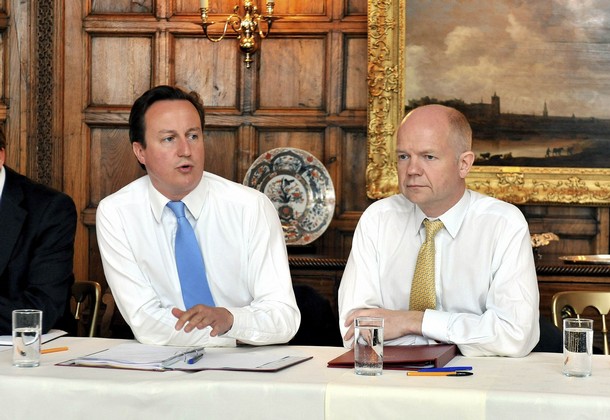
From Will Inboden, Foreign Policy: A year ago I speculated on what a Tory foreign policy might look like. One thing that I didn’t anticipate is that it might look so much like David Cameron himself. That is, not content to delegate the national security portfolio to capable ministers such as William Hague and Liam Fox, Cameron has emerged as a major foreign policy player in his own right. Whether a distinctive "Cameron Doctrine" in British foreign policy might emerge remains to be seen. What appears so far is an effort to reassert the U.K.’s posture on the global stage through building new alliances, repairing old ones, bolstering British commerce, and generating headlines through "straight talk."
Cameron’s first weeks in office were heavy on domestic policy, marked by his proposed dramatic budget cuts and decentralizing National Health Service reforms. Although evoking outrage from the usual interest groups (especially public sector unions), such measures will be indispensable for returning the U.K. to fiscal solvency, restoring broad-based economic growth, and reigniting the U.K.’s moribund entrepreneurial sector. More recently, Cameron’s global travels from the U.S. to Turkey to India have been marked by a series of brash statements. Whether confident assertions of national interest (defending BP in Washington), shameless pandering (criticizing Israel in Turkey), or impolitic yet true criticisms (denouncing Pakistan’s ties to terror groups in India), Cameron is serving notice that he intends to be the main voice of British foreign policy. …
What about Afghanistan? Cameron has tried to straddle fragile and diminishing public support for the U.K.’s Afghanistan deployment with the security imperatives of the NATO mission by announcing a withdrawal date of 2015. Even this, however, sends a signal of irresolution to British troops in theatre. In private conversations I had last week with several British Army officers, every one voiced frustration that a specified withdrawal date demoralizes their forces and encourages the Taliban enemy. (No surprise, they found the Obama administration’s July 2011 drawdown date even more indefensible). The Afghan question has major implications for other U.K. concerns as well. For example, as Walter Ladwig has pointed out, Cameron’s hopes for a partnership with India hinge in part on the U.K.’s sustained and successful commitment to a stable and peaceful Afghanistan. (photo: Reuters)
Image: reuters%208%204%2010%20David%20Cameron%20William%20Hague.jpg
